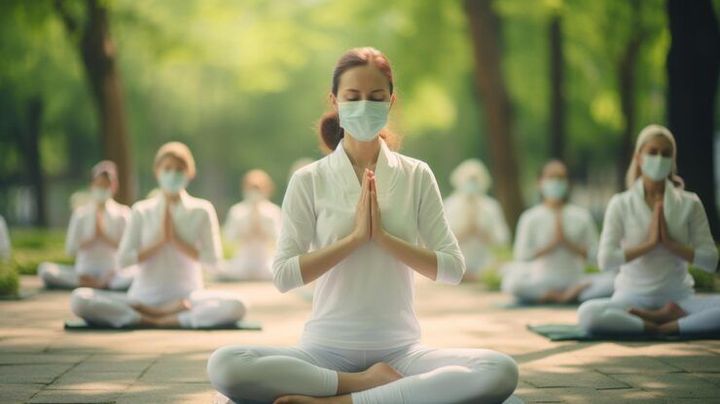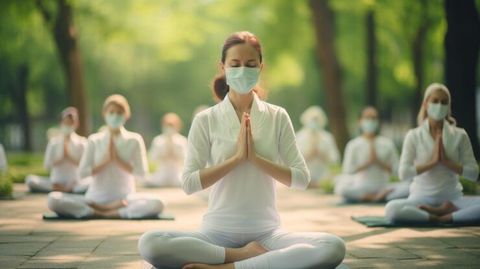
Discover How Yoga Supports Mental Health Tips, Advice, and Practical Knowledge
Yoga is a mind–body discipline rooted in ancient traditions designed to promote balance, awareness, and inner stability. Over time, it has evolved from a spiritual practice into a widely recognized method for enhancing emotional wellness, cognitive clarity, and overall mental resilience. Today, yoga is studied globally for its psychological benefits such as reducing stress levels, improving concentration, and supporting emotional regulation.
Modern lifestyles often involve digital overload, long working hours, and irregular routines, contributing to stress, anxiety, and low energy. Yoga exists as a structured yet adaptable way to counter these challenges through mindful movement, breathing practices, and meditative focus. High-value informational keywords such as stress reduction techniques, mindfulness practices, emotional wellness strategies, relaxation methods, mental clarity exercises, and holistic well-being remain central to understanding how yoga supports mental health.

Importance
Yoga is increasingly relevant today as people experience rising mental-health struggles across all age groups. Young professionals encounter burnout, students face academic pressure, and adults manage lifestyle-related stress. This creates a widespread demand for natural, holistic solutions that enhance emotional balance and build mental stability.
The importance of yoga lies in how it addresses multiple psychological concerns at once. It helps reduce cortisol, supports deeper sleep, enhances self-awareness, and improves emotional processing. These outcomes are essential for those navigating anxiety, mood fluctuations, and chronic stress.
This topic matters because:
-
It offers accessible mental-health support using non-medical techniques.
-
It strengthens mind–body awareness, leading to long-term emotional resilience.
-
It contributes to healthier workplace performance by improving focus and concentration.
-
It encourages mindful habits that counter digital overstimulation.
-
It supports students, working professionals, parents, and older adults alike.
Yoga also fills a critical gap in everyday mental-health guidance by providing structured, evidence-based practices people can integrate into daily routines. High CPC informational keywords such as mental well-being, mind–body techniques, anxiety reduction strategies, emotional balance, and holistic stress management help reinforce the value of yoga in today’s world.
Recent Updates
The past year has seen several important developments in the relationship between yoga and mental health:
Key Trends (2024–2025)
-
Growing Workplace Wellness Adoption (2024): Many global companies integrated yoga-based mental-wellness programs to reduce employee stress and enhance productivity.
-
Mental-Health Awareness Growth (2024–2025): Increased awareness campaigns highlighted the impact of mindfulness and yoga on reducing digital fatigue and emotional burnout.
-
Research Advancements (Jan–Sep 2024): Studies published in 2024 showed improved cognitive flexibility and reduced anxiety symptoms in individuals practicing yoga three times a week.
-
Rise of Hybrid Yoga Platforms (2024): Online and offline yoga sessions gained popularity, allowing individuals to customize routines for mental clarity and relaxation.
-
Incorporation of Breathwork (2025): Breathwork techniques such as pranayama gained stronger attention for supporting nervous-system regulation.
Below is a simple table summarizing popular yoga practices and their mental-health impacts:
| Yoga Practice | Primary Benefit | Helpful For |
|---|---|---|
| Mindful Breathing | Reduces stress | Anxiety, overwhelm |
| Restorative Yoga | Promotes relaxation | Fatigue, burnout |
| Hatha Yoga | Enhances balance | Emotional stability |
| Meditation + Yoga Nidra | Improves sleep | Insomnia, restlessness |
| Vinyasa Flow | Boosts focus | Low concentration |
These trends show that yoga is not only traditional but also modern, adaptable, and supported by recent wellness data.
Laws or Policies
Yoga and mental health are often supported through various national wellness programs, regulations, and government-led initiatives. While policies differ by country, many regions recognize yoga as a tool for public well-being.
Examples of policy influence include:
-
National Wellness Guidelines: Many countries include yoga in lifestyle and mental-health recommendations to promote healthier routines and reduce stress-related illnesses.
-
School and University Wellness Programs: Education systems in several regions encourage yoga-based activities to support student focus and emotional stability.
-
Workplace Wellness Regulations: In some countries, employee-wellness frameworks highlight yoga as an effective mental-wellness activity for enhancing job performance.
-
Community Health Programs: Public health departments often promote yoga during mental-health awareness campaigns to encourage relaxation and mindfulness.
These policies indicate a growing recognition of yoga as a supportive mental-health tool backed by structured guidelines and wellness frameworks.
Tools and Resources
Here are helpful tools and resources related to yoga and mental wellness. These enhance understanding, provide guidance, and support self-practice:
Mobile Apps
-
Insight Timer – Guided meditation, mindful breathing, and mental-health content
-
Headspace – Yoga-inspired mindfulness and stress-reduction audio
-
Down Dog Yoga – Customizable yoga sequences for relaxation and focus
-
Calm – Mindfulness sessions and gentle stretching routines
Websites and Platforms
-
Mental-health knowledge libraries
-
Online yoga study resources
-
Research portals for wellness trends
-
Mindfulness and relaxation practice guides
Templates and Tools
-
Yoga routine planner sheets
-
Stress-management trackers
-
Breathing-exercise worksheets
-
Mood-monitoring charts
Table: Useful Yoga-Based Mental-Health Tools
| Tool Type | Purpose |
|---|---|
| Breathing Timer | Helps regulate stress levels |
| Pose Guide PDF | Supports safe practice |
| Meditation Timer | Improves consistency |
| Mood Journal Template | Tracks emotional patterns |
These tools make it easier to integrate yoga into daily routines for improved mental wellness.
FAQs
1. How does yoga improve mental health?
Yoga helps regulate the nervous system, reduce stress hormones, enhance mindfulness, and improve emotional balance. The combination of physical movement, breathing, and meditation creates a holistic approach that supports mental stability and clarity.
2. How often should someone practice yoga for mental-health benefits?
Practicing yoga three to five times a week is commonly recommended for noticeable improvements in stress reduction, mental clarity, and emotional balance. Even short 10–15 minute routines can support relaxation.
3. Which yoga style is best for stress management?
Restorative yoga, Hatha yoga, yoga nidra, and gentle breathing practices are especially effective for reducing stress and calming the mind.
4. Can beginners use yoga for mental health?
Yes. Yoga is suitable for beginners and can be adapted to all ages and fitness levels. Starting with simple poses, breathing exercises, and mindfulness practices is often enough to create positive mental-health effects.
5. Does yoga support concentration and productivity?
Yes. Regular yoga and breathwork practices help improve focus, enhance cognitive flexibility, and reduce mental distractions, making them useful for students and working professionals.
Conclusion
Yoga continues to be one of the most valuable mind–body techniques for supporting mental health in today’s fast-paced world. Its combination of mindful movement, breath control, and meditative focus creates a powerful framework for emotional well-being, stress reduction, relaxation, and cognitive clarity.
With growing research, global wellness programs, and accessible digital tools, yoga offers practical support for individuals seeking mental stability and holistic balance. Incorporating a simple routine—whether through mindful breathing, restorative poses, or guided relaxation—brings long-term benefits that strengthen overall mental wellness and daily life performance.










